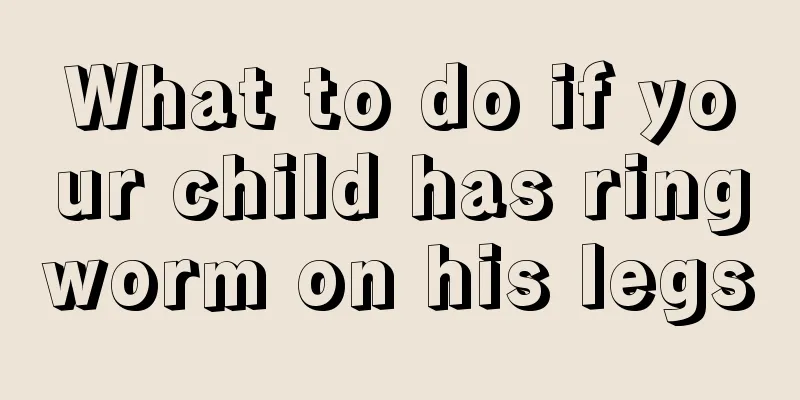What to do if your child has allergies

|
Children are mainly prone to inheriting allergies from their parents. All those who are allergic should undergo desensitization treatment before pregnancy to reduce the possibility of inheritance of allergies to a certain extent. In addition, if breastfeeding is possible after delivery, try to breastfeed. Breastfeeding can improve the baby's breathing and gastrointestinal function, reducing the possibility of allergies to a certain extent. This article also introduces several ways to improve it, let’s take a look. 1. Treatment methods for children with allergic constitution First, parents desensitize Heredity is a major reason why children have allergic constitutions, so if parents have allergic constitutions, they must actively take desensitization treatments to reduce the possibility of passing on the allergy to the next generation. Second, breastfeeding Food additives and high protein in dairy products may become allergens for babies, but breast milk helps to enhance the baby's resistance to infection and prevent respiratory and gastrointestinal infections. Therefore, breast milk is the most ideal natural food for babies. When conditions permit, breastfeeding should be encouraged. Third, exercise Parents should take their babies outdoors more often to breathe fresh air, bask in the sun, and do some appropriate exercise, which can enhance their physical fitness and improve their defense against diseases. Fourth, balanced nutrition When preparing daily diet for the baby, parents should promptly supplement the various nutrients needed by the baby's body, such as trace elements zinc, vitamin A, etc., to reduce the incidence of respiratory infections and improve the baby's immunity. Fifth, vaccination Parents can effectively improve their babies' immunity to these respiratory infectious diseases by vaccinating their babies against measles, whooping cough, rubella, etc. on time. 2. How to feed children with allergies 1. When feeding your baby, new mothers should know which foods may cause allergies in their baby. These foods mainly include protein-rich milk and eggs; seafood such as fish, shrimp, crab, seashells, and kelp; green onions, garlic, leeks, coriander, onions, and lamb with special smells; chili peppers, pepper, mustard, and ginger with special stimulation; raw foods such as tomatoes, raw peanuts, raw walnuts, peaches, and persimmons; foods rich in bacteria such as dead fish, dead shrimp, and stale meat; foods containing mold such as mushrooms and rice vinegar; foods that are difficult to digest such as clams, squid, and cuttlefish; seed foods such as various beans, peanuts, and sesame seeds. 2. When adding complementary foods to your baby, add small amounts and small varieties. The first complementary food added to the baby should be easy to digest and not prone to allergies, usually cereals, followed by vegetables and fruits. Generally, solid food, such as eggs, fish, peanuts, wheat, etc., should be added to the baby after six months, not too early or too late. Your baby's diet should be light and contain more foods rich in vitamins. After the baby's allergies have improved, the mother should also observe the baby's recovery over a long period of time: for example, allergies to milk and eggs will gradually disappear after the baby is fourteen months old; while allergies to peanuts and seafood will often accompany the baby for a lifetime. Signs of a healthy baby: Whether your baby is breastfed or bottle-fed, you want to know whether your baby is healthy. One of the best things to do is to take your baby to the doctor regularly, who will weigh him and plot a weight percentile chart (a graph that compares your baby's weight gain to the national average). If you have any questions about feeding, you can also discuss them with them. In short, you will have a comprehensive understanding of whether your baby is healthy: 1. Is his weight gain stable? 2. Is his skin color normal? 3. Whether his eyes are bright and energetic, and whether his muscles are strong; 4. Whether you feel satisfied after feeding; 5. Do you urinate 6 times or more in 24 hours? 6. Is the stool soft? Only healthy babies can have good resistance and better prevent allergic diseases. |
<<: What to do if your child has allergies
>>: Is herpes virus contagious in children?
Recommend
What to do if your child has eczematous dermatitis?
Eczematous dermatitis is a common skin disease in...
What are the advantages and disadvantages of scraping for children?
Nowadays, scraping is a very good way to maintain...
How to educate a one-year-old baby_How to educate a one-year-old baby
Every baby needs early education. Early education...
What should I do if my child has a hoarse voice?
Children are very prone to illness in spring, mai...
How old should children be to start brushing their teeth?
Everyone wants to have white teeth, so have you b...
The baby's sleeping position can tell his personality
The baby's sleeping position can be judged fr...
What to do if your child has anorexia and picky eating
In the early childhood period, children generally...
The easiest way to treat a child's stuffy nose
Children often have nasal congestion problems. In...
What should I do if my child has ADHD?
Children nowadays are becoming more and more acti...
What medicine is good for baby's stomach ache?
Among the various diseases that babies may suffer...
Is it normal for a child to poop several times a day?
As mothers, from the moment their children are bo...
Best time to give your baby a bath
Babies have poor body resistance, so it is import...
What are the symptoms of gastroenteritis in an 8-year-old?
Gastroenteritis is not unfamiliar to young people...
The newborn farts after struggling hard
There are many strange things about newborns, so ...
What is the reason for frequent urination in little boys?
Frequent urination and urgency are more likely to...









